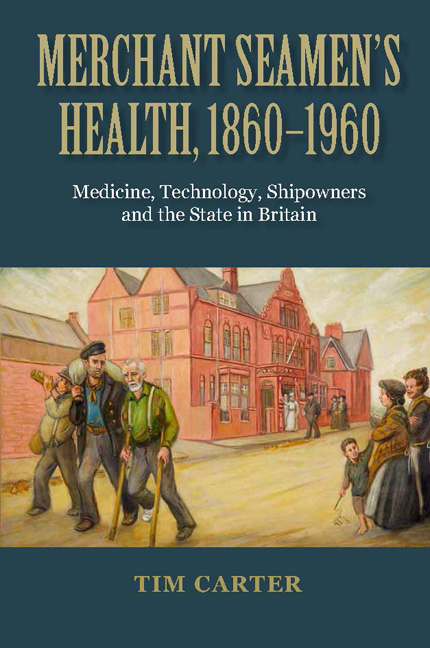Book contents
- Frontmatter
- Dedication
- Contents
- List of Illustrations
- Preface
- Acknowledgements
- List of Abbreviations
- Glossary of nautical terms used
- Introduction
- 1 Health at sea before 1860
- 2 Unseaworthy seamen
- 3 The health of merchant seamen in the nineteenth century
- 4 Injury and disease at sea in the nineteenth century
- 5 The seaman ashore: victim, threat or patient?
- 6 Bad food and donkey's breakfasts
- 7 Fit for lookout duties
- 8 The long-term health of seamen
- 9 War, manpower and fitness for service
- 10 Seamen's health in the welfare state
- 11 Retrospect and prospect
- Bibliography
- Index
9 - War, manpower and fitness for service
Published online by Cambridge University Press: 05 November 2014
- Frontmatter
- Dedication
- Contents
- List of Illustrations
- Preface
- Acknowledgements
- List of Abbreviations
- Glossary of nautical terms used
- Introduction
- 1 Health at sea before 1860
- 2 Unseaworthy seamen
- 3 The health of merchant seamen in the nineteenth century
- 4 Injury and disease at sea in the nineteenth century
- 5 The seaman ashore: victim, threat or patient?
- 6 Bad food and donkey's breakfasts
- 7 Fit for lookout duties
- 8 The long-term health of seamen
- 9 War, manpower and fitness for service
- 10 Seamen's health in the welfare state
- 11 Retrospect and prospect
- Bibliography
- Index
Summary
Seamen at war
From the 1860s merchant seamen, and sometimes officers too, were commonly seen by shipowners and the state as a commodity to be purchased at market rates, with terms of service that were limited to a set period, usually three years in the deep-water trades. Prior to the 1850s, while seamen were still casually employed on merchant ships the state took the view that seafaring manpower should be maintained and developed as a national resource serving both naval and commercial requirements. The state intervened by requiring indentured apprentices to form part of the complement of merchant ships, on a scale dependent on the size of the vessel. In addition these apprenticeships at sea also provided a way for poor law guardians to move pauper youths off their books and into work that was no longer a charge on the poor rate. However, despite the separation of naval and merchant ship manning in the 1850s, whenever there was a war, merchant ships became part of the war effort and targets for enemy action. This was in addition to the creation of a Royal Naval Reserve based on those in the merchant service who could be called up in times of war.
The pattern of casual employment, and the attitudes of shipowners associated with it, often had a negative influence on the provision of a good diet, and decent working and living conditions, as well as on the arrangements for welfare, and for the prevention and treatment of illness and injury.
- Type
- Chapter
- Information
- Merchant Seamen's Health, 1860–1960Medicine, Technology, Shipowners and the State in Britain, pp. 136 - 152Publisher: Boydell & BrewerPrint publication year: 2014



